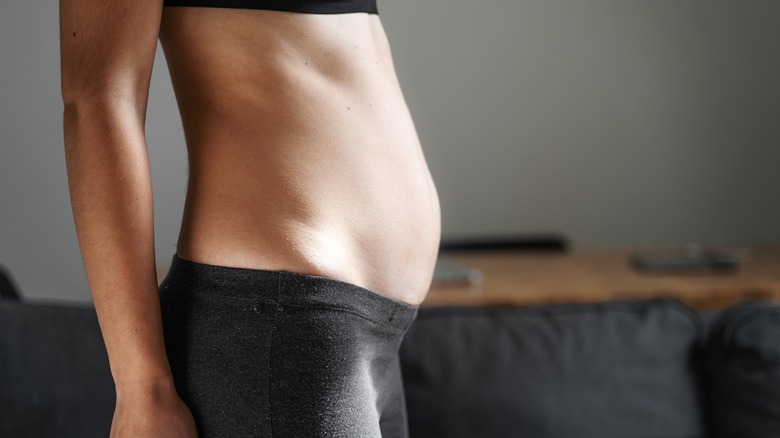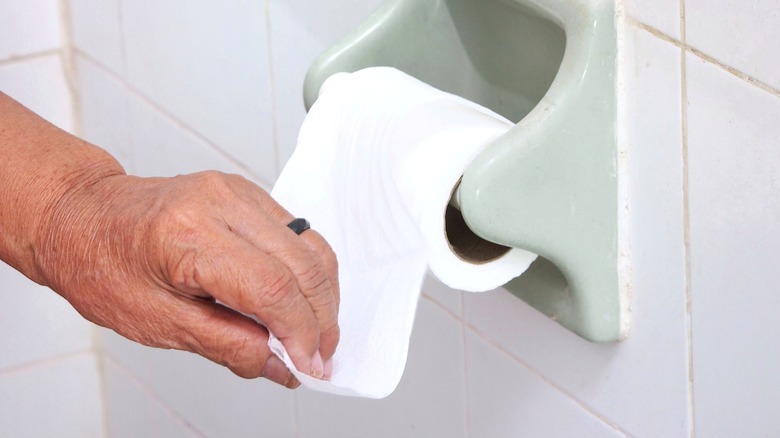Ways Following The Carnivore Diet Can Wreak Havoc On Your Digestive System
You might have seen something on your social media feed about Joe Rogan eating nothing but meat. Well, he's not the only one who's tried the carnivore diet. The diet was brought to mainstream media by Shawn Baker, an orthopedic doctor, who states it can help with health conditions like diabetes and depression.
While some people sing the praises of the carnivore diet, it can have some severe drawbacks regarding your gut health. Drastically changing your food dynamic takes your gut biome and body some time to adjust, leaving you with nausea and vomiting, acid reflux, constipation, diarrhea, and bloating. Many times, these issues clear up after the first few weeks on the diet, but for some, they can carry on longer.
The how and why of the havoc the carnivore diet wreaks on your digestive tract is due to the strict limitations it creates on what you eat. At its core, the carnivore diet is a restrictive form of the keto diet, where all carbs are cut out, including vegetables, nuts, certain dairy products, grains, and fruits, states Healthline. That only leaves you with all different varieties of beef, pork, poultry, and fish, just like your neighborhood lion or ancient cave-dwelling ancestor might have eaten.
Let's explore more deeply the digestive issues caused by the carnivore diet and why they happen.
Beginning a carnivore diet can lead to nausea
Enjoying a good steak or chicken on your plate for every meal might sound tempting, especially if you're a meat and potatoes person. But your system isn't ready for the all-out war of protein and fat when it's accustomed to getting a mix of carbs with its meat. Therefore, you could feel a bit of nausea and vomiting due to a need to switch energy sources.
Dietitian Kate Patton, M.Ed., R.D., CSSD, L.D., told the Cleveland Clinic, "Carbohydrates are your body's preferred energy source — what it's accustomed to using for energy. But if you don't eat carbs, your next resort is burning fat. And that comes from burning fat in foods you eat or your own body fat." Ketogenesis, when the body creates ketones from using fat for energy, takes a bit of time to get used to because your body has to shift over as things change, says Medical News Today.
According to Genes (Basel), a ketogenic diet also makes the bacteria of the gut shift since specific gut processes and enzymes are no longer necessary, which leads to various changes within the body and is also why the feeling of nausea improves with time. But, in the meantime, eating more fats, chewing slowly, eating smaller meals, and keeping hydrated can help.
Acid reflux is a side effect of the carnivore diet
Drastic changes in your food can also lead to belching and a burning feeling in your chest, which means your stomach acid is backing up into your throat where it doesn't belong. The acid bath in the back of your throat leaves the lining irritated and gives you a cough and a lump in your throat, per the Mayo Clinic.
Most of the time, acid reflux is due to gastroesophageal reflux disease (GERD), where the sphincter at the bottom of the stomach doesn't work correctly, letting acid move up the esophagus. However, the carnivore diet includes a lot of fat because it only consists of meat. Lindsey Albenberg, D.O., a gastroenterologist at the Children's Hospital of Philadelphia in Pennsylvania, told Everyday Health, "Fats take the longest to empty out of the stomach, so they keep people fuller, longer. On keto, delayed stomach emptying may leave your stomach full all the time, triggering abdominal discomfort and an increase risk of regurgitation and heartburn." Diets high in fat also need more bile and bile salts to be released by your liver to break everything down, but more bile in your system, combined with nausea and a full stomach, can be a recipe for disaster, per Healthline.
Taking measures to eat slowly and break your food into more meals can help, but you might also need medications to neutralize the acid or surgery to fix dysfunction, per the Mayo Clinic.
Abdominal pain, bloating can come from a carnivore diet
A delicate balance is taking place in your intestines on any given day; therefore, any kink in the system can lead to you feeling wretched. Cutting out your fiber source can make it difficult for food to experience a smooth ride through your intestinal tract. While your body figures out how to process all the rich proteins and fats you are throwing at it, you can feel uncomfortable, bloated, and gassy, per WebMD.
Christie Gagnon, a registered dietician, told Livestrong, "Fruits, vegetables and whole grains are excellent sources of dietary fiber, which keeps our digestive systems in tip-top shape. Avoiding these foods can result in decreased transit time (the amount of time it takes food to travel through our digestive tracts) and may lead to increased gas and bloating." Additionally, Medical News Today notes that foods high in the sulfur-rich amino acid cysteine — like beef, pork, and chicken — can create hydrogen sulfide when broken down. So, you'll be gassy and have farts that might be a bit stinker than average.
However, bloating isn't going to last forever. Your gut biome will adjust rather quickly to your no-carb diet, leading to a decrease in bloating after a few weeks. Supplementing electrolytes, water, and necessary vitamins can ensure you stay hydrated and your minerals stay balanced (per All Things Carnivore).
You might struggle with constipation
According to Dr. Albenberg in Everyday Health, "When it comes to gastrointestinal symptoms on a keto diet, I worry most about the lack of fiber in the diet, which can lead to constipation." The carnivore diet is the most extreme form of keto diet you can find, so sluggish intestines that make it hard to evacuate stool are just par for the course.
The Cleveland Clinic explains that having constipation is defined as going number two less than three times a week, but don't take this definition as a hard and fast rule since it varies for everyone. For example, if you're used to having a bowel movement every day or even several times a day, going more than a day or two without hitting the bathroom can leave you with pain, cramping, and bloating. More than considering the timeframe, it is better to look at the symptoms you're experiencing, like dry, hard stools, painful bowel movements, not emptying your intestines completely, and having a hard time passing waste.
Adding fiber to your carnivore diet isn't an option; therefore, you can try transitioning to the diet gradually to help your body ease into it. Medical News Today also notes possibly using laxatives and probiotics to help stimulate the intestines to get moving and drinking lots and lots of water.
Carnivore diet can bring on a bout of diarrhea
While some people experience extreme constipation when taking on the carnivore diet, the opposite is true for others. Rather than not going to the bathroom, diarrhea has them running to the restroom way too frequently. WebMD states that diarrhea is when you experience frequent loose bowel movements that can last for hours to weeks. Other symptoms include belly pain, cramping, nausea, urgent bowel movements, and even blood in stool.
The mechanism behind your bout of diarrhea is the fats and proteins flooding the gut. Callie Exas, a licensed nutritionist and co-owner of The Wellthy Plate, told Healthline, "When you consume too much fat, the body can't keep up with the breakdown and absorption. When unabsorbed fat gets into the small intestines and colon, more water will be pulled in to help its passage, resulting in watery diarrhea." Your liver and stomach aren't out to get you, though; this is a sign that your system is resetting and adjusting to your new way of life.
The expelling of water can also lead to dehydration; therefore, consuming more water than usual is essential to keep your body balanced. You'll also want to get extra sodium and potassium (electrolytes) to keep your gut in check.






